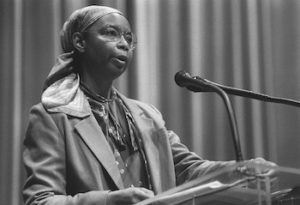
Gayle Jones
*Gayle Jones was born on this date in 1949. She is a Black writer. Jones is from Lexington, Kentucky, and is the daughter of Franklin and Lucille Jones.
She grew up in Speigle Heights, a neighborhood, in a house with no indoor toilet. Her father was a restaurant cook, and her mother, who wished to be a writer, stayed home. She grew up in a storytelling family: Her grandmother wrote plays for her church, and her mother constantly made up stories to entertain the children and other family members. She recalls, "I began to write when I was seven because I saw my mother writing and because she would read stories to my brother and me, stories that she had written." Although described as painfully shy, many of Jones's elementary school instructors recognized her writing skills and encouraged her talent to grow.
Jones is a 1971 graduate of Connecticut College, receiving her Bachelor of Arts degree in English. While attending college, she also earned the Frances Steloff Award for Fiction. She then began a graduate program in creative writing at Brown University, studying under poet Michael Harper and earning a Master of Arts in 1973 and a Doctor of Arts in 1975. Harper introduced her work to author Toni Morrison. At the time, an editor at Random House was so impressed after reading Jones's manuscript that she once wrote: "that no novel about any Black woman could ever be the same after this." In 1975, Jones published her first novel, Corregidora. That same year, she was a visiting lecturer at the University of Michigan, which hired her as an assistant professor the following year.
She left her faculty position in 1983 and moved to Europe, where she wrote and published Die Vogelfaengerin (The Birdwatcher) in Germany and a poetry collection, Xarque and Other Poems. Jones's 1998 novel The Healing was a finalist for the National Book Award. However, the media attention surrounding her novel's release focused more on the controversy in her personal life than the work itself. While studying at the University of Michigan, Jones met a politically active student, Robert Higgins, who would eventually become her husband. At a gay rights parade in Ann Arbor, Michigan, in the early 1980s, Higgins claimed to be God and that AIDS was a form of punishment. After being punched by a woman at the parade, he returned with a shotgun and was arrested with a charge that carried four years in jail.
Instead of appearing in court to face charges, Jones and Higgins fled the United States to Europe. Jones resigned from the University of Michigan with a note addressed to President Ronald Reagan: "I reject your lying racist [expletive], and I call upon God. Do what you want. God is with Bob, and I'm with him."
Some have debated the authorship of the note. 1988, Jones and Higgins returned to the United States but kept their identities hidden. In the late 1990s, Jones's mother was diagnosed with throat cancer. In 1997, Higgins objected to a medical procedure for his mother-in-law but was banned from the hospital room after a psychological evaluation of Jones's mother found she was "inappropriately manipulated by family, especially son-in-law." Jones and Higgins wrote up a document about the incident called "Kidnapped/Held Incommunicado," which was sent to the national press and, on March 3, 1997, was forwarded to President Bill Clinton and Vice President Al Gore.
On March 20, Jones's mother died, igniting Higgins to start a campaign against the University of Kentucky Markey Cancer Center, which had been the defendant in several civil rights cases in the recent past. During this time, Jones's novel The Healing was in the process of being released. Higgins began to bombard the Lexington police, calling and writing them multiple times daily. A letter that arrived at the police station on February 20, 1998, indicated a bomb threat, and police figured out that Higgins, who was using the alias Bob Jones, was previously wanted for arrest. After a standoff with police at their residence, Higgins committed suicide, and Jones was put on suicide watch.
Since then, Jones has only talked to family and Harper and has refused several interview requests. Her papers are housed at the Howard Gotlieb Archival Research Center at Boston University. Jones currently lives in Lexington, Kentucky, where she continues to write. Jones has described herself as an improviser. Her work bears out that statement: like a jazz or blues musician, Jones plays upon a specific set of themes, varying them and exploring their possible permutations. Though her fiction has been called "Gothic" in its exploration of madness, violence, and sexuality, musical metaphors might make for a more apt categorization.